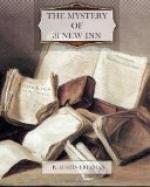“Naturally,” replied Thorndyke, “my suggestion implies that the person who was with her was not Jeffrey Blackmore.”
“But he was!” bawled Winwood. “The porter saw him!”
“The porter saw a person whom he believed to be Jeffrey Blackmore. I suggest that the porter’s belief was erroneous.”
“Well,” snapped Winwood, “perhaps you can prove that it was. I don’t see how you are going to; but perhaps you can.”
He subsided once more into his chair and glared defiantly at Thorndyke.
“You seemed,” said Stephen, “to suggest some connection between the sick man, Graves, and my uncle. I noted it at the time, but put it aside as impossible. Was I right. Did you mean to suggest any connection?”
“I suggest something more than a connection. I suggest identity. My position is that the sick man, Graves, was your uncle.”
“From Dr. Jervis’s description,” said Stephen, “this man must have been very like my uncle. Both were blind in the right eye and had very poor vision with the left; and my uncle certainly used brushes of the kind that you have shown us, when writing in the Japanese character, for I have watched him and admired his skill; but—”
“But,” said Marchmont, “there is the insuperable objection that, at the very time when this man was lying sick in Kennington Lane, Mr. Jeffrey was living at New Inn.”
“What evidence is there of that?” asked Thorndyke.
“Evidence!” Marchmont exclaimed impatiently. “Why, my dear sir—”
He paused suddenly, and, leaning forward, regarded Thorndyke with a new and rather startled expression.
“You mean to suggest—” he began.
“I suggest that Jeffrey Blackmore never lived at New Inn at all.”
For the moment, Marchmont seemed absolutely paralysed by astonishment.
“This is an amazing proposition!” he exclaimed, at length. “Yet the thing is certainly not impossible, for, now that you recall the fact, I realize that no one who had known him previously—excepting his brother, John—ever saw him at the inn. The question of identity was never raised.”
“Excepting,” said Mr. Winwood, “in regard to the body; which was certainly that of Jeffrey Blackmore.”
“Yes, yes. Of course,” said Marchmont. “I had forgotten that for the moment. The body was identified beyond doubt. You don’t dispute the identity of the body, do you?”
“Certainly not,” replied Thorndyke.
Here Mr. Winwood grasped his hair with both hands and stuck his elbows on his knees, while Marchmont drew forth a large handkerchief and mopped his forehead. Stephen Blackmore looked from one to the other expectantly, and finally said:
“If I might make a suggestion, it would be that, as Dr. Thorndyke has shown us the pieces now of the puzzle, he should be so kind as to put them together for our information.”
“Yes,” agreed Marchmont, “that will be the best plan. Let us have the argument, Doctor, and any additional evidence that you possess.”




